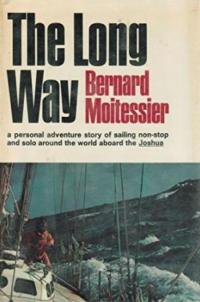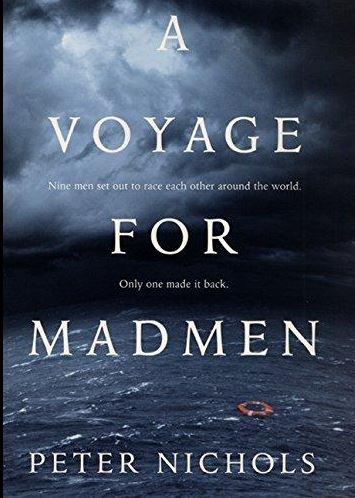With the exciting Vendée Globe solo, non-stop around-the-world race winding up and the anticipated re-running of the Golden Globe Race in 2018, these cold winter nights encourage a trip back in time into the pages of where it all began. In 1968, sailing alone around the world non-stop was one of the last frontiers, much like walking on the moon, and while two voyages in the 60s suggested that such a feat was possible, it was from far from guaranteed. In the days before GPS, satellite
phones, and web feeds, a solo trip around the world through the Southern Ocean non-stop really constituted a voyage filled with suspense. Curling up with a book or four about the original Golden Globe Race brings the race to life.Peter Nichols's “A Voyage for Madmen” serves as a logical starting point since it provides a fascinating overview of the race and racers start to finish. It seems that in a race as profoundly challenging as circumnavigating the globe alone, the personalities and mental toughness of the competitors captures our imagination the most. What kind of sailor takes on such an extraordinary challenge? By contrasting the dry wit and grounded nature of Robin Knox-Johnston and the spiritual sense of well-being of Bernard Moitissier with the desperation and probable despair of Donald Crowhurst, “A Voyage for Madmen” offers the reader a chance to contemplate both human triumph and tragedy in the face of extreme duress.
And whether it’s because solo long distance racing is not exactly logical or because the stories of the individual racers resonate in their own words, perusing a memoir about the race offers a different, more in-depth perspective on the race.
In “A World of My Own,” Robin Knox-Johnston recounts his voyage around the world aboard Suhaili through log entries and recollections. Dry wit punctuates the text. Despite being labeled “distressingly normal” in a pre-race psychological profile, Knox-Johnston often checks that his sanity is intact. At one point in his journey, he thought he really might be losing his mind because he started hearing voices. To his relief, his tape recorder got jostled and started playing back his earlier log entries. Relatively early in the race, he lost Suhaili’s self-steering and was faced with retiring from the race. Instead, he learned to balance his boat with sail trim, something all of us could practice. He enjoys his daily ration of whiskey, and more refreshingly, enjoys himself immensely even as he deals with hardship on the Southern Ocean. His memoir speaks of self-confidence, pride, and the joy of accomplishing something truly (and perhaps for most of us) incomprehensibly difficult.

In contrast to the accomplishments of Knox-Johnston and Moitissier, “The Strange Last Voyage of Donald Crowhurst” by Nicholas Tomalin and Ron Hall retells the ill-fated campaign of Crowhurst. An in-debt, amateur sailor with a trimaran’s build months behind schedule, Crowhurst started the Golden Globe Race only to decide his boat was not up for the task. He instead stayed in the Atlantic and faked his log books. As other sailors retired from the race, he became one of only two boats remaining, and desperate to conceal his fraud, he descended into madness and eventually committed suicide. His boat was found abandoned in the Atlantic. His log books are all that remain to show what passed through his mind on his lonely voyage. Even more than a sad sailing yarn, this is a tragic reflection of how one bad decision leads to another and another, eventually resulting in unnecessary disaster and loss.
(Editor’s note: the documentary film “Deep Water” about Crowhurst is well done. Look for the upcoming film “The Mercy” starring Colin Firth and Rachel Weisz.)
These four books stand in stark contrast to the daily updates, radio interviews, and video from the race course provided by this year’s Vendee Globe. Even the French Navy ventured into the far southern parts of the Indian Ocean to film the front runners. Only time will tell how closely the 2018 Golden Globe Race can approximate the isolation of its predecessor half a century ago.
--by Tracy Leonard





